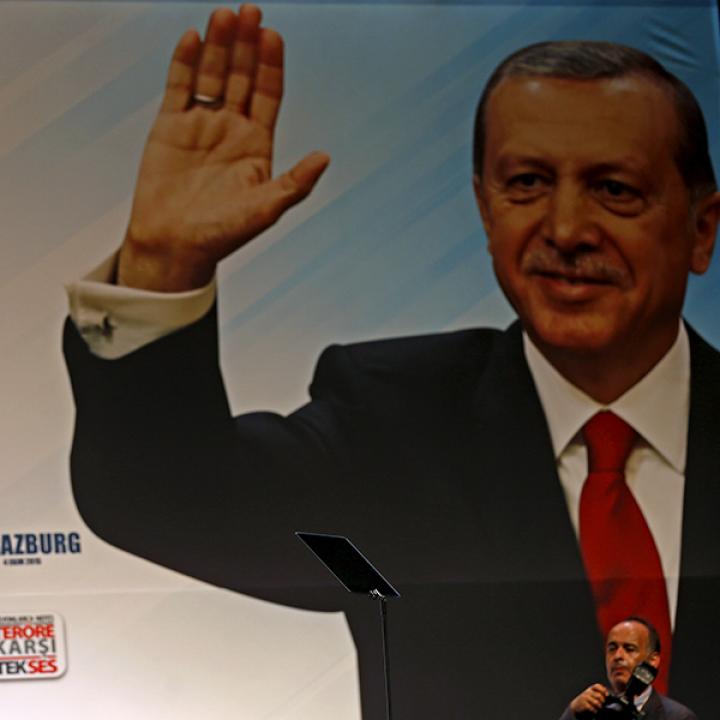

President Erdogan has catapulted his country into crisis through his attempt to stay in power.
On June 17, Turkish President Recep Tayyip Erdogan denounced as illegitimate the ongoing protest march from the Turkish capital, Ankara, to Istanbul, organized to demand justice regarding Erdogan's media crackdown and led by Turkey's main opposition Republican People's Party, or CHP, as it's also known. He has even threatened that Kemal Kilicdaroglu, CHP's head, could be detained. And he has already arrested Selahattin Demirtas, the head of Kurdish nationalist Peoples' Democracy Party, or HDP, the third largest faction in the Turkish legislature after his Justice and Development Party, widely known as AKP, and CHP.
Erdogan, a divisive, right-wing politician, has realized that he cannot continue to govern the country the way he likes so long as it is democratic and is therefore taking steps to end Turkish democracy.
Since coming to power through his reformed-Islamist AKP in 2003, Erdogan has gradually become more autocratic. He has accomplished this by playing the "authoritarian underdog," as I explain in The New Sultan. Building on the narrative that Islamists were persecuted under Turkey's past secularist system, Erdogan now portrays himself as a victim who is grudgingly forced to suppress those conspiring to undermine his authority.
Erdogan has intimidated the media and the business community by ordering politically motivated tax audits and jailing dissidents, scholars and journalists. His police regularly crack down on peaceful opposition rallies. A constitutional referendum that Erdogan won on April 16, albeit by a slim margin, allows him to appoint high court judges without a confirmation process, as well as folding the executive and legislative branches under Erdogan.
He has achieved enormous success in elections by demonizing and politically brutalizing various demographics, mostly leftists, which will not vote for him. As a result, while the conservative half of the country adores him, the other half holds a profound resentment of him. Erdogan has plenty of enemies waiting for him to fall from power. In any case, he knows that the corruption charges brought against him and members of his family in 2013 have left him with no graceful way to exit the scene.
As a result of Erdogan's need to stay in power, while Turkey's elections continue to be free, they are increasingly not fair. Evaluating voting in the April 16 constitutional referendum, the Organization for Security and Cooperation in Europe reported that government-appointed provincial governors have restricted "freedom of assembly and expression" by using the "extraordinary state of emergency powers," which Erdogan put in place following the failed coup of July 2016.
Erdogan has used that abortive coup to consolidate power, further alienating his opponents. After the putsch attempt, initial purges targeted members of the conservative Gulen movement -- an erstwhile Erdogan ally that appears to have played a role in planning the abortive coup. However, Erdogan has also used post-coup state of emergency measures to purge and arrest thousands of leftists, liberals and Kurds. Forty thousand people have been jailed since July 2016. Less than a year after the coup, Turkey cannot be considered a democracy anymore.
Together with deep societal polarization and Erdogan's complete domination and personalization of power, these developments have catapulted Turkey into a permanent state of crisis. The Islamic State group and Kurdistan Workers Party, or PKK, terror attacks, which have killed over a thousand people over the last two years, have added to the toxic mix.
Fighting with the PKK domestically and in Syria, where Ankara has been battling the PKK-allied Kurdish People's Protection Units, or YPG, exacerbates Turkey's crisis. Tensions with Russia, Iran and the Assad regime, all of which Erdogan is confronting in Syria's civil war, mean that Erdogan also has external enemies that want to see him fall and Turkey spiral into chaos.
Moscow will play a key role in undermining Erdogan. In the run-up to the April referendum, Russian-government-owned Sputnik's Turkish service campaigned against Erdogan, and did so unabashedly. During the referendum campaign, Sputnik's Turkish website published over twice as much (and overwhelmingly anti-Erdogan) material as the combined outputs of Deutsche Welle, Voice of America, Al-Jazeera and BBC -- other foreign media with Turkish-language services.
Where does Turkey go from here? I see two trajectories for the country in which Erdogan is the central character. As Erdogan ends democracy, his opponents will refuse to fold under him, working tirelessly to undermine his agenda. Turkey's political polarization will increasingly turn violent. This is what happened in, of all places, Washington on May 16, when Erdogan's guards and pro-Erdogan Turks beat up anti-Erdogan Turks and Kurds in front of the residence of the Turkish ambassador. Violence will beget violence.
Even more worrisome, Turkey's chasm will expose it to the machinations of its foreign enemies, such as Moscow and Damascus -- which will take advantage of their traditional ties with radical Kurds, PKK, YPG, and Turkish leftists to hurt Erdogan -- as well as the jihadists, who are already challenging Erdogan's brand of conservativism from the far right. Over the last two years, the Islamic State group has carried out almost a dozen attacks in Turkey, killing over 300 people.
Coupled with these threats, the country's crisis could catapult Turkey onto another path: a dangerous and unfortunate civil conflict. In this trajectory, Erdogan would be remembered as the leader who brought about the breakdown of modern Turkey.
Soner Cagaptay, the Beyer Family Fellow and director of the Turkish Research Program at The Washington Institute, is the author of The New Sultan: Erdogan and the Crisis of Modern Turkey.
U.S. News & World Report



